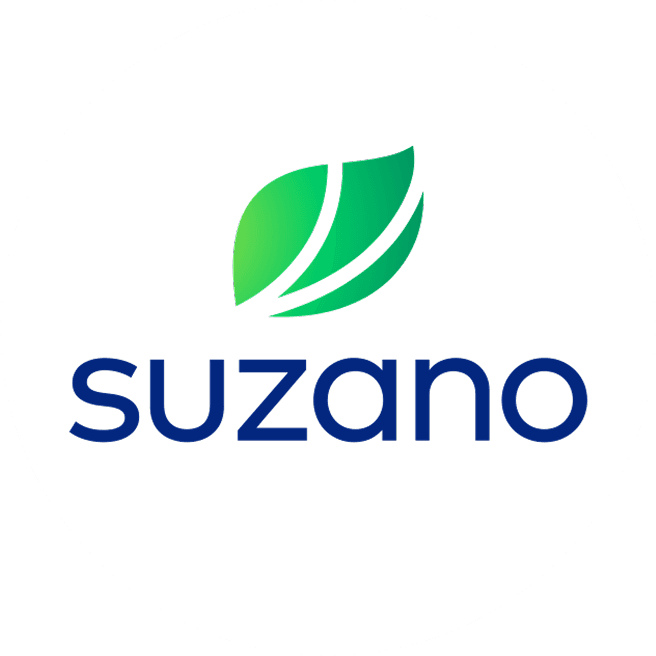
Reduce emissions in pulp & paper with biomass gasification
 Suzano
SuzanoSummary
Biomass converted into renewable syngas to replace fossil fuels in lime kilns, reducing emissions and boosting energy efficiency
Context
Suzano is Brazilian pulp manufacturer, facing the challenge of reducing emissions in energy-intensive industrial operations, particularly in thermal systems like lime kilns. The company’s decarbonization strategy includes replacing fossil fuels with renewable sources, focusing on scalable solutions.
Location of the initiative: Ribas do Rio Pardo, Mato Grosso do Sul, Brazil
Solution
The initiative involves implementing a biomass gasification plant capable of converting biomass into syngas. This renewable syngas replaces fossil fuels in lime kilns, reducing CO₂ emissions by up to 97%. The plant also generates steam and electricity from lignocellulosic residues—such as black liquor and biomass—, promoting energy self-sufficiency .
Key steps:
Collection and preparation of biomass
Gasification to produce syngas
Integration of syngas into lime kilns
Performance and emissions monitoring
Figure 1: Suzano’s biomass gasification plant
Impact
Sustainability Impact
Climate
This initiative directly impacts Scope 1 emissions (combustion in lime kilns), and indirectly Scope 2 (electricity generation) and Scope 3 (logistics and inputs). Replacing fossil fuels with renewable syngas reduces CO₂ emissions from lime kilns by up to 97%. Lime kilns emissions represent approximately 35% of Suzano’s scope 1 emissions.
Nature
By valorizing biomass products, the initiative avoids improper disposal and contributes to the conservation of natural resources, reducing pressure on fossil sources and promoting sustainable biomass use.
The facility has the smallest average structural radius of the forest base among Suzano’s operations, with only 65 kilometers between plantation areas and the factory—significantly lower than the structural average of 150 kilometers. This unique feature minimizes logistics costs and the environmental impact associated with pulp transportation.
Social
In addition to generating over 10,000 direct jobs at the peak of construction and thousands of indirect jobs, the development of the new facility stimulated the local economy and contributed to workforce qualification. More than 1,300 individuals were trained for industrial, forestry, and logistics operations, and approximately 300 people were prepared for the local labor market in commerce and services through partnerships with SENAI and SENAC. Beyond the resources allocated to the factory, logistics infrastructure, and eucalyptus plantation areas, Suzano invested over BRL 300 million in a comprehensive set of initiatives, including housing units, a medical center, local infrastructure improvements, and support for social projects. As part of the Basic Environmental Plan (PBA), the Urban Infrastructure Program, approved in 2021 by public and civil society representatives, encompasses 21 projects in health, education, social development, housing, and public safety. Key deliverables include the expansion of the Municipal Hospital and the construction of a Family Health Strategy (ESF) unit, a Shelter House, a Civil Police Station, and a Federal Highway Police (PRF) Operational Unit. Additionally, Suzano promoted voluntary social initiatives focused on sustainable development, income generation, and poverty reduction. These investments were distributed across seven areas: education, income generation, rights protection, infrastructure, health, community relations, and employment. In education, Suzano supported public school quality improvement through teacher training. Income generation efforts included support for family farming, beekeeping, livestock, circular economy, and creative economy. Rights protection actions focused on preventing violence against children, adolescents, and women, considered priority groups in this initiative.
1. Job Creation & Economic Stimulation
10,000+ direct jobs during construction and thousands of indirect jobs
Boosted local economy
2. Workforce Training & Qualification
1,300 trained in industrial, forestry, and logistics operations
300 trained in commerce and services (with SENAI & SENAC partnerships)
3. Community Investments
BRL 300M+ in housing, medical center, local infrastructure, and social projects
4. Urban Infrastructure & Public Services (PBA Program)
21 projects in health, education, social development, housing, and public safety
Key deliverables: Municipal Hospital expansion, ESF unit, Shelter House, Civil Police Station, PRF Operational Unit
5. Voluntary Social & Sustainable Development Initiatives
Focus on seven areas: education, income generation, rights protection, infrastructure, health, community relations, employment
6. Examples of Initiatives
Education: Teacher training, school quality improvement
Income Generation: Family farming, beekeeping, livestock, circular/creative economy
Rights Protection: Prevention of violence against children, adolescents, women
Business Impact
Benefits
Approximately 20% increase in pulp production capacity
Reduced dependence on fossil fuels
Improved energy and logistics efficiency
Replication potential in other industrial units
Costs
High initial investment in gasification infrastructure
Operational costs depend on stable biomass supply
Potential access to clean technology subsidies
Cost minimization through integration with existing processes and internal waste use
Implementation
Typical Business Profile
Energy-intensive industries, especially in the pulp and paper sector, with access to biomass and interest in Scope 1 decarbonization.
Approach
Emissions and biomass availability assessment
Design and construction of gasification plant
Integration testing with lime kilns
Continuous monitoring and operational adjustments
Stakeholders Involved
Project Leads: Suzano’s engineering, operations, sustainability, procurement teams among others
Company Functions: Engineering, logistics, procurement, financial planning, operations
Main Providers: Gasification technology suppliers
Others: Local communities and biomass suppliers
Key Parameters to Consider
Mature technology with large-scale application in the sector
Advanced implementation stage with initial results
Geographic relevance: regions with biomass availability
Potential subsidies and tax incentives
Implementation and Operations Tips
Project is already implemented and is running since middle of 2024.
Ensure continuous biomass supply
Invest in syngas quality control
Provide technical training for operational teams
Monitor emissions and energy performance